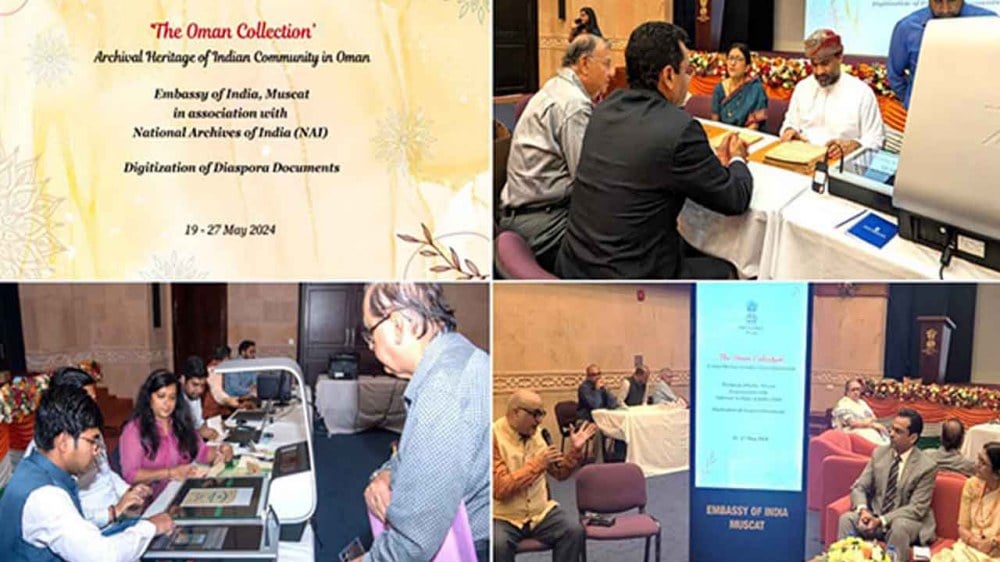
The Indian Embassy in Muscat, in collaboration with the National Archives of India (NAI), has successfully undertaken a unique and pioneering initiative to archive historical documents of the Indian diaspora living in Oman.
A special digitization and oral history project 'The Oman Collection – Archival Heritage of the Indian Community in Oman' was organized at the Indian Embassy premises in Muscat from May 19 to 27, 2024. The project saw enthusiastic participation of 32 prominent Indian families from the Indian state of Gujarat, who have been living in Oman for generations and have a history dating back 250 years. This was NAI's first overseas project to digitize and archive diaspora documents, a significant step in preserving the history and heritage of the Indian community abroad.
Indian community in Oman
Today there are around 700,000 Indians living in Oman. India and the Sultanate of Oman share rich historical and cultural ties that go back over 5000 years. In more recent times, since the late 18th century some merchant families from Mandvi, Surat and other parts of Gujarat have settled in Sur, Matrah and Muscat. They are an integral part of Omani society, and many of them have become Omani citizens, but they also maintain strong ties with their motherland, India.
Record number of documents digitised
Under this project, over 7000 documents in English, Arabic, Gujarati and Hindi languages were scanned and digitised from the private collections of old Indian merchant families. The oldest digitised document dates back to 1837, while most of the remaining documents date back to the late 19th and early 20th centuries. Personal diaries, account books, ledgers, telegrams, trade invoices, passports, citations, letters and correspondence, photographs and other documents provide a fascinating glimpse into the lives and contributions of the Indian community in the Sultanate of Oman. A wide variety of documents have been digitised. These documents collectively form a vivid account of the history of the Indian community in Oman, including their cultural practices, social activities, trade and commerce as well as their contribution and integration into Omani society and preservation of Indian traditions abroad. The digitised documents will be archived and uploaded on NAI’s digital portal ‘Abhilekh Patal’, making these documents available to researchers and the wider public.
The following private collections of Indian/Indian-origin families have been digitised
1. Ratansi Purushottam clan
2. Khimji Ramdas Family
3. Haridas Nanu I Family
4. Bhanji Haridas Mundrawala Family
5. Narayandas and Shanta Toprani Family
6. Maganlal Manji Vyas Family
7. Vijay Singh Velji Pawani Family 8. Lakhu Ved Family
9. Chimanlal Chhotelal Surti Family
10. Jayantilal Vadher family
11. Kanaujia family
12. Ramesh Khimji Family
13. Visumal Damodardas Family
14. Vijay Singh Purushottam Toprani Family
15. Jamnadas Keshavji Family
16. Naranji Heerji family
17. Velji Arjun Pavani Family
18. Purushottam Damodar Family
19. Pandya family
20. Meghji Nenshi Family
21. Shah Nagardas Manji Family
22. Ajit Khimji Family
23. Khatau Ratansi Toprani family
24. Ratanshi Gordhandas Bajaria Family
25. Harshendu Hasmukh Shah Family
26. Very Gurnani Family
27. Mohanlal Arjun Pavani Family
28. Dhanji Morarji “Shabika” Family
29. Abji Sunderdas Ashar Family
30. Dharamsi Nancy Family
31. Kiran Asher Family
32. Bakul Mehta Family
historical record
Apart from digitisation of historical documents, the project also involved recording of oral histories of older members of the Indian community, the first such oral history project undertaken by the National Archives of India. These first-hand accounts cover a wide range of stories including personal anecdotes, migration experiences and the evolution of the Indian community in Oman over the decades, which will enrich the archival record.

Noting the unique significance of this project, Shri Arun Singhal, Director General, National Archives of India (NAI) said, “This is the first time that we have collected and digitised private archives of diaspora documents from abroad. This is a historic milestone for NAI and an important step towards preserving the rich heritage and stories of the diverse overseas Indian community.
His Excellency Amit Narang, Indian Ambassador to the Sultanate of Oman, said, “This project is in line with Prime Minister Shri Narendra Modi’s vision of strengthening engagement with the Indian diaspora across the world. We are reviving an important aspect of our shared heritage and recording and preserving it. We are also reviving the history of the Indian community in Oman thus encouraging closer engagement with our diaspora.”
Sheikh Anil Khimji, leader of the Indian community in Oman, expressed his gratitude for the project. He said, “We thank External Affairs Minister Dr. S. Jaishankar and Prime Minister Shri Narendra Modi for their vision to enhance connectivity and engagement with the Indian diaspora. The preservation of historical records of the Indian diaspora by the Indian Embassy will make a significant contribution in preserving their history for a long time. The preservation of historical records in this way also reflects the long-standing friendship between India and the Sultanate of Oman.”
The initiative was supported by Oman's National Records and Archives Authority (NRAA), which provided the necessary logistical and other support, ensuring smooth implementation of the project. The digitisation project aims to preserve historical records as well as foster more focused engagement with Oman's Indian expatriate community, thereby further promoting the long-standing friendship between India and Oman. The project will also enable better research on the development and contributions of the Indian diaspora, which will also be a useful resource for future generations.
 look news india
look news india

